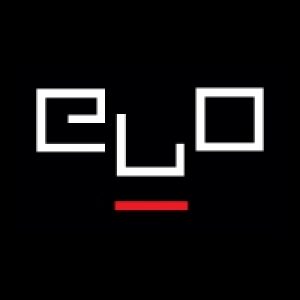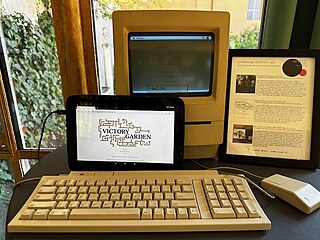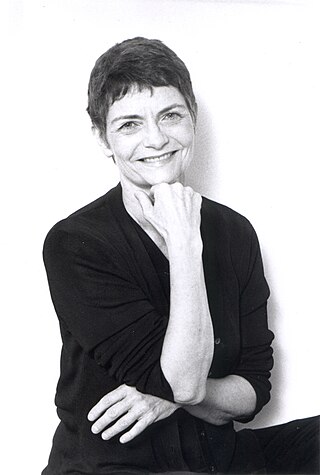Hypertext fiction is a genre of electronic literature characterized by the use of hypertext links that provide a new context for non-linearity in literature and reader interaction. The reader typically chooses links to move from one node of text to the next, and in this fashion arranges a story from a deeper pool of potential stories. Its spirit can also be seen in interactive fiction.
Electronic literature or digital literature is a genre of literature where digital capabilities such as interactivity, multimodality or algorithmic text generation are used aesthetically. Works of electronic literature are usually intended to be read on digital devices, such as computers, tablets, and mobile phones. They cannot be easily printed, or cannot be printed at all, because elements crucial to the work cannot be carried over onto a printed version.

afternoon, a story, spelled with a lowercase 'a', is a work of electronic literature written in 1987 by American author Michael Joyce. It was published by Eastgate Systems in 1990 and is known as one of the first works of hypertext fiction.

The Electronic Literature Organization (ELO) is a nonprofit organization "established in 1999 to promote and facilitate the writing, publishing, and reading of electronic literature". It hosts annual conferences, awards annual prizes for works of and criticism of electronic literature, hosts online events and has published a series of collections of electronic literature.

Victory Garden is a work of electronic literature by American author Stuart Moulthrop. It was written in Storyspace and first published by Eastgate Systems in 1991. Victory Garden is one of the earliest examples of hypertext novels, and is notable for being very inventive and influential in its genre. It is often discussed along with Michael Joyce's afternoon, a story as an important work of hypertext fiction.
Stuart Moulthrop is an innovator of electronic literature and hypertext fiction, both as a theoretician and as a writer. He is author of the hypertext fiction works Victory Garden (1992), which was on the front-page of the New York Times Book Review in 1993, Reagan Library (1999), and Hegirascope (1995), amongst many others. Moulthrop is currently a Professor of Digital Humanities in the Department of English, at the University of Wisconsin–Milwaukee. He also became a founding board member of the Electronic Literature Organization in 1999.

David Kolb is an American philosopher and the Charles A. Dana Professor Emeritus of Philosophy at Bates College in Maine.
Judy Malloy is an American poet whose works embrace the intersection of hypernarrative, magic realism, and information art. Beginning with Uncle Roger in 1986, Malloy has composed works in both new media literature and hypertext fiction. She was an early creator of online interactive and collaborative fiction on The WELL and the website ArtsWire.
Kate Armstrong is a Canadian artist, writer and curator with a history of projects focusing on experimental literary practices, networks and public space.

Stephanie Strickland is a poet living in New York City. She has published ten volumes of print poetry and co-authored twelve digital poems. Her files and papers are being collected by the David M. Rubenstein Rare Book And Manuscript Library at Duke University.
Marjorie Coverley Luesebrink was an American writer, scholar, and teacher. Writing hypermedia fiction under the pen name M.D. Coverley, she is best known for her epic hypertext novels Califia (2000) and Egypt: The Book of Going Forth by Day (2006). A pioneer born-digital writer, she is part of the first generation of electronic literature authors that arose in the 1987–1997 period. She was a founding board member and past president of the Electronic Literature Organization and the first winner of the Electronic Literature Organization Career Achievement Award, which was named in her honor. Lusebrink was professor emeritus, School of Humanities and Languages at Irvine Valley College (IVC).

John Barber is a digital artist and scholar based in Vancouver, Washington. He is predominantly focused on sound art. Barber married Dene Grigar.
Aaron Tucker is a Canadian writer, digital artist, and scholar.
Richard Holeton is an American writer and higher-education administrator. His creative works are foundational in the hypertext and electronic literature genres. As a writer, his most notable work is the hypertext novel Figurski at Findhorn on Acid, which has been recognized as an important early work of electronic literature and is included in the hypertext canon.
Jessica Pressman is a scholar who studies electronic literature including digital poetry, media studies, and experimental literature. She creates works that examine how technologies affect reading practices that are displayed through several media forms.

Figurski at Findhorn on Acid is a hypertext novel by Richard Holeton published on CD-ROM by Eastgate Systems in 2001 and republished on the open web by the Electronic Literature Lab, Washington State University, in 2021. Re-Imagined Radio presented a radio interpretation of this novel in 2022 in which Holeton made an appearance. It is a work of interactive fiction with various paths for readers to choose from, an early example of electronic literature, and one of 23 works included in the literary hypertext canon.

King of Space is a work of electronic literature by author Sarah Smith. This interactive narrative is set in a collapsing solar system aboard an abandoned starship, where an escaped terrorist encounters the last star-captain and his ship's Priestess. The story weaves elements of gaming into a dark science-fictional ritual of fertility and regeneration.

Uncle Buddy's Phantom Funhouse is an early multimedia hypermedia text written by John McDaid and released by Eastgate Systems in 1993. The main portion of Funhouse was written for Macintosh's HyperCard app, but portions of the hypermedia novel are also contained in the original box. The use of transmedia storytelling, meta-fiction, and epistolary format makes this a potential early example of an alternate reality game.
The NEXT: Museum, Library, and Preservation Space is a repository of net art, electronic literature and games. It is supported by Washington State University at Vancouver and the Electronic Literature Organization. This is a digital museum dedicated to reviving and maintaining these works to make them accessible to all. Physical artifacts are held at the Electronic Literature Lab in Washington, US.










